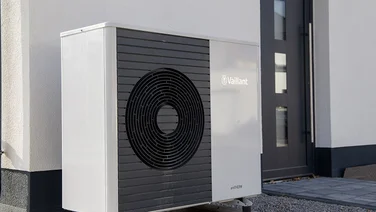We receive a small fee from trusted installers when you request a quote through our site. This helps us keep our content independent, well-researched and up to date – Learn more
- What is a water meter?
- Is it possible for anybody to switch to a water meter?
- Is it worth getting a water meter?
- Pros and cons of a water meter
- How much does a water meter cost?
- How to get a water meter
- How long does it take to install a water meter?
- What to do if you are refused a water meter
- Next steps
- FAQs
✔ 60% of households in England and Wales have a water meter
✔ It’s expensive to have a meter installed in Scotland
✔ If you can’t get a water meter, you can request an ‘assessed charge bill’
If you’re wondering whether to make the switch to a water meter, you’re not alone. In an age where every penny counts, many are asking whether a water meter could be the ticket to shrinking their monthly bills.
Not only can a meter offer a more accurate reflection of your water usage, but it can also be a nudge towards a more eco-conscious lifestyle. But is it the right choice for you?
Read on as we dive into the pros, cons and everything in between, so you can make an informed decision to save your money and help the planet.

What is a water meter?
A water meter is a gadget that keeps tabs on how much water you’re using in your home or business. It’s usually set up right where the main water line comes into your property, so it can accurately track your usage for billing.
How does a water meter work?
A water meter measures the volume of water flowing into your home, usually in cubic metres or litres. It operates much like your car’s odometer, with a mechanical or digital display that ticks along as water passes through.
Smart water meters use advanced technology to transmit readings remotely, allowing for more frequent and accurate billing.
How many UK homes have a water meter?
According to recent figures from the Consumer Council for Water (CCW), 60% of households in England and Wales have a water meter installed. That translates to about 16 million homes keeping track of their water usage.
Is it possible for anybody to switch to a water meter?
Most people can switch to a water meter if they choose to, but the availability can vary depending on where you are in the UK, your property, and your water supply company.
In many places, water companies encourage the switch as it often leads to lower bills for consumers. Some homes, however, still receive estimated water bills, which are based on the ‘rateable value’ of their property and not actual water usage.
Meters can be a better option for some, as estimated bills can sometimes be higher than actual usage. However, some properties can’t have a water meter because of the impracticality or high expense of installation.

Is it worth getting a water meter?
Whether it’s worth getting a water meter depends on various factors, including your water consumption habits, household size, and location.
Meters often benefit smaller households and those who are conscious about their water use, as you pay for the exact amount you consume. However, larger households with high water usage might find standard rates more economical.
Doing a bit of research and possibly a water-use audit can help you make an informed decision – the CCW offers a handy cost calculator to help with your decision.
Pros and cons of a water meter
- You pay only for the water you use, so it’s usually cheaper for people who use less water
- Easier to identify leaks and overuse
- Encourages responsible water consumption
- Outside of England and Wales, it’s not free to have a meter installed
- High-consumption households might end up paying more via a meter
- Limited period to opt back out to estimated bills – and you can’t opt out in some places
On the plus side, a water meter ensures you pay only for the water you use. Automatic tracking can make it easier to identify leaks or overuse, and the meter naturally encourages more responsible water consumption.
However, the drawbacks include steep installation costs outside of England and Wales (more on that below). And while smaller households often find meters more economical, high-consumption households may see an increase in their bills.
Moreover, there’s usually a limited period to switch back to estimated bills, and in some places, reverting isn’t an option at all. In areas designated as ‘water-stressed’ (areas with low rainfall or near water parks, for example) it can be compulsory for a water meter to be installed.
How much does a water meter cost?
In England and Wales, it’s usually free to get a water meter installed, which is great for encouraging water conservation. However, in Scotland, it’s a different story as the onus is on the requester to pay for one to be installed.
But in Northern Ireland, you don’t even have to worry about it – there aren’t any domestic water charges, so there’s no need for a meter.
How to get a water meter
If you’re in England or Wales, getting a water meter is usually as easy as pie – simply get in touch with your local water company to request one.
To kick things off, they’ll send an engineer to visit your home for a quick survey to make sure your property is a good fit for a meter. Then once you get the green light, they’ll set up an appointment to install – usually within a few months, depending on availability.
If you’re in Scotland, the process is similar, but brace yourself: you’ll need to cover the costs of a survey upfront, plus the installation labour and any building, joinery and plumbing work needed around the installation.
How long does it take to install a water meter?
It’s relatively quick and painless to get a water meter installed. Once you’ve got your approval and appointment, a technician from your water company will come out to have you up and running in no time.
The installation itself usually takes about an hour, but it can vary based on the complexity of your plumbing. Just remember to check with your water company for specific time estimates, as it could vary.
Does the installation cause much disruption?
Overall, installing a water meter is a fairly quick and low-impact process.
The technician will typically install the meter close to where your property’s main water supply enters your home, which is often outside. They will turn the water supply off for a short period – typically less than 30 minutes – while the meter is being installed.
Most of the work is done externally, so they will rarely need to enter your home. You won’t need to do anything to prep in advance, but it’s good to have the area clear for easy access.
What to do if you are refused a water meter
If you’re refused a water meter, you’ve got options. Water companies in England and Wales should install meters for free upon request, unless it’s impractical, like in flats with shared pipes.
Here, you can still request an ‘assessed charge bill’ from your water company. Each company calculates this bill differently, but common factors include the number of bedrooms, the type of property, and the number of occupants.
If you believe that your water company unjustly refused your meter request, you can appeal to the water regulator, Ofwat. Remember, it’s your right to have billing that reflects your situation as closely as possible.
Next steps
Deciding whether to get a water meter boils down to your household size, water usage habits, and where you live.
While a meter can lead to savings and promote water conservation, it might not work for everyone. Start by trying the CCW’s water meter calculator to see how much you could save.
FAQs
Is it better to have a water meter or not?
It depends on your situation. A water meter charges you for the exact amount of water you use, which can encourage conservation and lead to savings, especially for smaller households.
What are the disadvantages of having a water meter?
Having a water meter means your bill is based on actual usage, which could mean that you might be better off staying on a fixed rate if your home has high water usage. Plus, you may come across hurdles if you decide to switch back to unmetered billing later on down the line.
Do I legally need a water meter?
In the UK, there’s no legal requirement for most households to have a water meter. However, some areas facing water shortages may make them mandatory, and all new properties built after 1990 have had water meters installed by default.








